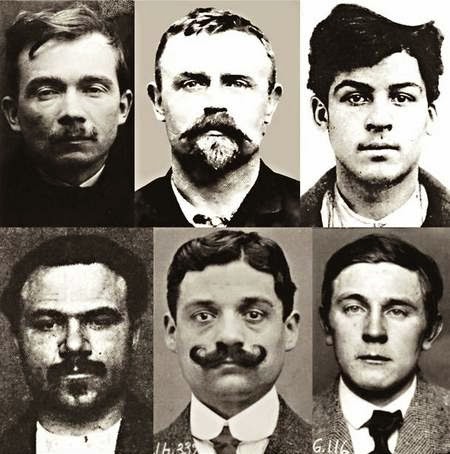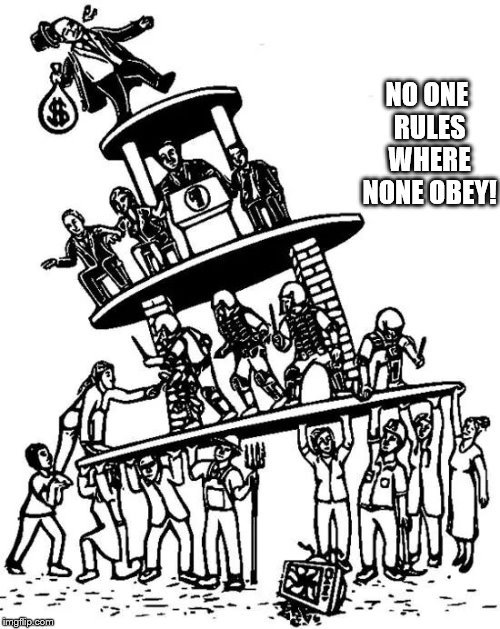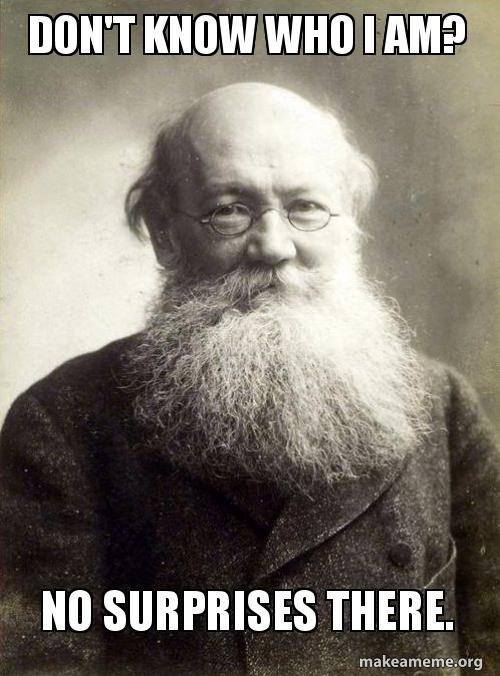At some point the folks calling themselves anarchists, but that are really minarchists, libertarians, or just fools, will figure out that what they have been telling anybody that would listen about themselves was wrong, confirming the listener's belief that they were full of crap.
They like the idea of being totally free of the spectacle, but in reality they just want a safe space more than anything else.
Somewhere that they can feel in control of their surroundings.
Every man a king.
Principles that sound good when presented to them as a supposition, but when actually confronted with real life, you can watch the changes in their eyes when they figure out that that karate move they saw in that classic kung fu movie won't really work for them.
Amusing, to say the least.
Far be it for them to find a friend and actually practice, or to learn any info that their cognitive biases don't agree with.
We live in a world of fantasy violence, a Disneyland for Dummies, if you will.
If you know someone like this, do us all a favor and point them to this post, eh?
Meet some really dedicated anarchists.

Illegalism is an anarchist philosophy that developed primarily in France, Italy, Belgium, and Switzerland during the early 1900s as an outgrowth of individualist anarchism.
The illegalists openly embraced criminality as a lifestyle.
Not to be confused with the concept of "popular illegalisms" created by Michel Foucault in Discipline and Punish.
Emergence
Illegalism first rose to prominence among a generation of Europeans inspired by the unrest of the 1890s, during which Ravachol, Ãmile Henry, Auguste Vaillant, and Caserio committed daring crimes in the name of anarchism, in what is known as propaganda of the deed.
Influenced by theorist Max Stirner's egoism, the illegalists in France broke from anarchists like Clement Duval and Marius Jacob who justified theft with a theory of la reprise individuelle (Eng: individual reclamation).
Instead, the illegalists argued that their actions required no moral basis - illegal acts were taken not in the name of a higher ideal, but in pursuit of one's own desires.
"In Paris, this milieu was centred on the weekly paper, Anarchie and the Causeries Populaires (regular discussion groups meeting in several different locations in and around the capital each week), both of which were founded by Albert Libertad and his associates".
Anarchie, January 3, 1907
After Peter Kropotkin along with others decided to enter labor unions after their initial reservations, there remained the anti-syndicalist anarchist-communists, who in France were grouped around Sebastien Faureâs Le Libertaire.
From 1905 onwards, the Russian counterparts of these anti-syndicalist anarchist-communists become partisans of economic terrorism and illegal expropriations.
Illegalism as a practice emerged and within it "The acts of the anarchist bombers and assassins ("propaganda by the deed") and the anarchist burglars ("individual reappropriation") expressed their desperation and their personal, violent rejection of an intolerable society.
Moreover, they were clearly meant to be exemplary, invitations to revolt.".
But in another less dramatic sense "At that time this term was used to indicate all those practices prohibited by law that were useful for resolving the economic problems of comrades: robbery, theft, smuggling, counterfeiting money and so on."
Such acts of rebellion which could be individual were in the long run seen as acts of rebellion which could ignite a mass insurrection leading to revolution.
Proponents and activists of this tactic among others included Johann Most, Luigi Galleani, Victor Serge, and Severino Di Giovanni.
"In Argentina, these tendencies flourished at the end of the 20s and during the 30s, years of acute repression and of flinching of the once powerful workers movement this was a desperation, though heroic, of a decadent movement."
France's Bonnot Gang was the most famous group to embrace illegalism.
The Bonnot Gang (La Bande à Bonnot) was a French criminal anarchist group that operated in France and Belgium during the Belle Ãpoque, from 1911 to 1912.
Composed of individuals who identified with the emerging illegalist milieu, the gang utilized cutting-edge technology (including automobiles and repeating rifles) not yet available to the French police.
Originally referred to by the press as simply "The Auto Bandits", the gang was dubbed "The Bonnot Gang" after Jules Bonnot gave an interview at the office of Petit Parisien, a popular daily paper.
Bonnot's perceived prominence within the group was later reinforced by his high-profile death during a shootout with French police in Nogent-sur-Marne.
http://www.submedia.tv/stimulator/2013/01/18/podcast-2/
http://www.executedtoday.com/2013/04/21/1913-bonnot-gang-members-anarchist-illegalists/
https://libcom.org/files/Richard%20Parry%20-%20The%20Bonnot%20Gang.pdf
So much to read, so little time.


Curated for #informationwar (by @wakeupnd)
Ways you can help the @informationwar!
Downvoting a post can decrease pending rewards and make it less visible. Common reasons:
Submit
I flag trash. You have received a flag.
Downvoting a post can decrease pending rewards and make it less visible. Common reasons:
Submit
Buen dia,espero este bien,aqui mi visita,saludos y que pase un dia maravilloso
Downvoting a post can decrease pending rewards and make it less visible. Common reasons:
Submit